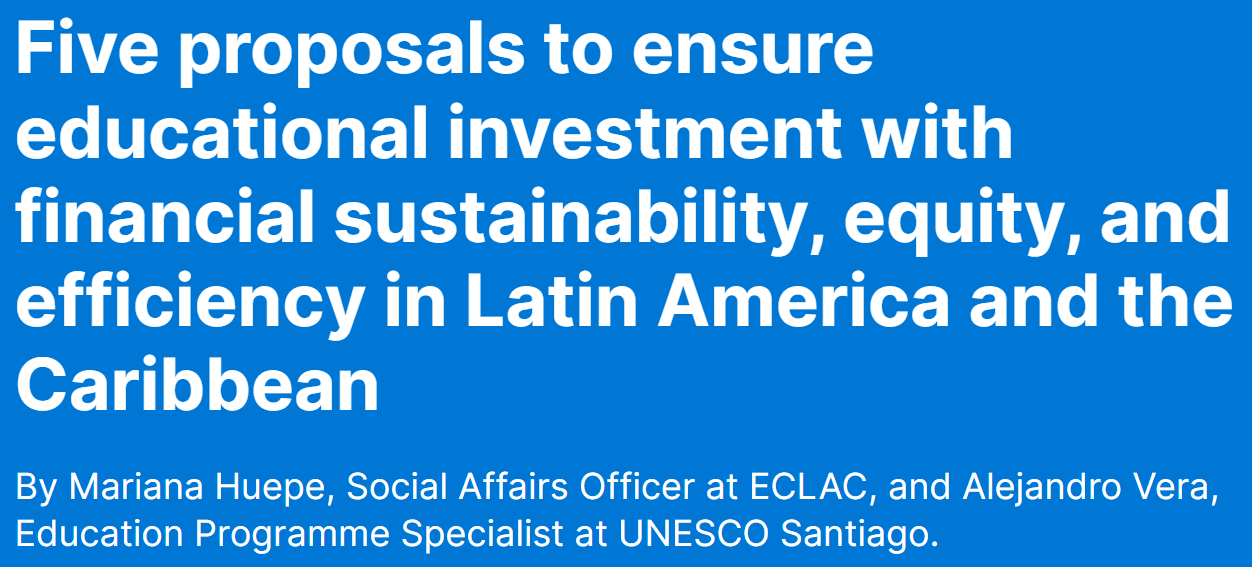Blog #Leading SDG4 Education 2030 "Five proposals to ensure educational investment with financial sustainability, equity, and efficiency in Latin America and the Caribbean"
Work area(s)
Topic(s)
This article is part of the #FundEducation blog series, which focuses on the urgent need to bridge the financing gap for SDG 4: Quality Education for All. The series gathers insights from partners and experts in education finance, reflecting on the challenges of enhancing the volume, efficiency, and quality of resources dedicated to education worldwide, as well as the actions needed to ensure that education is adequately funded in the future.

As highlighted in an earlier blog entry, in response to the 2024 Santiago Declaration, United Nations agencies, development banks, and civil society organizations agreed on five key proposals to transform education financing in Latin America and the Caribbean. These proposals are: i) expanding the fiscal space for education, ii) defining minimum investment standards per student, iii) improving spending efficiency, iv) coordinating intersectoral resources, and v) promoting public–private partnerships for specific purposes. The goal is to foster sustainable educational investment in order to build more inclusive and high-quality education systems and to position education at the center of the region’s development strategy.
Recognizing the importance of financing as an enabling condition for the needed recovery, revitalization, and transformation of education in Latin America and the Caribbean, the region’s Ministers of Education, through the 2024 Santiago Declaration, called for the creation of an inter-institutional working group to advance a regional strategy that ensures educational investment that is financially sustainable, and more equitable and efficient.
This group—comprising the Economic Commission for Latin America and the Caribbean (ECLAC), the United Nations Educational, Scientific and Cultural Organization (UNESCO), the International Institute for Educational Planning (IIEP) of UNESCO, the United Nations Children's Fund (UNICEF), the World Bank, the Inter-American Development Bank (IDB), the Development Bank of Latin America and the Caribbean (CAF), and the Latin American Campaign for the Right to Education (CLADE)—developed five key proposals to guide educational investment in the region, grounded in financial sustainability, equity, and improved implementation efficiency. These are summarized below.
- Expand the fiscal space for education
The first proposal is clear and direct: without greater resources, educational transformation will not be possible. Latin America and the Caribbean have an average tax burden of more than 10 percentage points below the OECD average. This limitation reduces the capacity of States to finance quality public services, including education.
The group proposes that countries take steps to expand fiscal space for education, including progressive tax reforms that strengthen public revenues and reduce the financial burden currently placed on households. In addition, it encourages the exploration of innovative financing mechanisms, such as debt-for-education swaps and thematic or impact bonds, to channel resources to the sector without compromising macroeconomic sustainability.
- Define minimum investment standards per student
While many countries in the region comply with at least one of the investment commitments outlined in the Incheon Declaration, per-student investment remains insufficient to guarantee the right to quality education for all. In this context, the group recommends establishing minimum per-student investment standards, based on the actual cost of providing inclusive, high-quality education in specific contexts. These benchmarks can serve as technical and political references for planning fairer and more sustainable education budgets.
- Improve spending efficiency
More investment is not enough if resources are not well used. The third proposal focuses on improving the efficiency of education spending. This includes enhancing costing, monitoring, and accountability systems, as well as strengthening the capacity of Ministries of Education to use this information in decision-making.
Many countries currently face limitations in the availability and quality of financial and educational data. For this reason, the group also proposes expanding and strengthening Education Management Information Systems (EMIS), including financing and resource use data, with disaggregations that allow for addressing multiple and overlapping inequalities.
- Coordinate intersectoral resources
Social inequalities create significant barriers to access and retention in education systems. To address them, the group recommends advancing comprehensive and intersectoral policies that align resources from the education sector with those from health, social protection, transportation, infrastructure, and others. Such coordination would help ensure the material conditions necessary for schooling and enhance the impact of education investment by enabling children and youth to actively participate in learning processes.
- Promote public–private partnerships for specific purposes
Finally, the group recommends promoting public–private partnerships in the education sector, where appropriate, to finance targeted investment projects, such as those related to infrastructure construction and maintenance, while avoiding their use for recurrent expenditures.
The private sector can be a key ally in mobilizing resources and capabilities to expand access to quality education, if partnerships are established under clear contractual, regulatory, and transparency frameworks that protect public education and ensure equitable service provision.
A shared commitment to the future
These five proposals offer a strategic framework to guide national and regional efforts toward an education investment agenda that drives transformation in Latin America and the Caribbean—grounded in financial sustainability, equity, and efficiency.
Their implementation will require political will and sustained social dialogue. States—and especially Ministries of Education—must lead this process by building broad-based consensus and durable partnerships that place education at the heart of development strategies. Ensuring the right to quality education is not only a moral imperative, but also a prerequisite for building a better shared future for the region.
Disclaimer: This blog section features insights and ideas from the SDG4 High-Level Steering Committee members and other education partners on transforming education and leading SDG 4. The opinions expressed are those of the authors alone.

